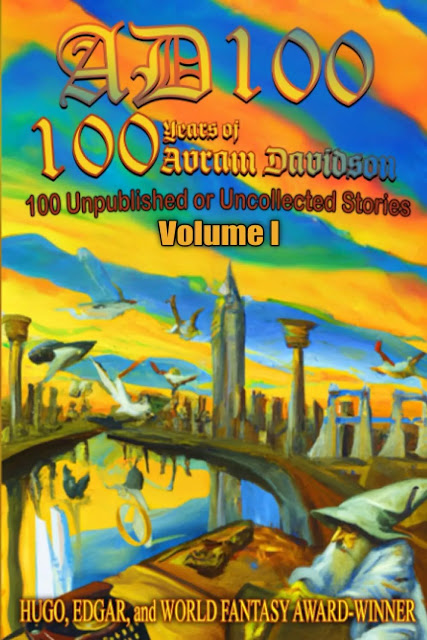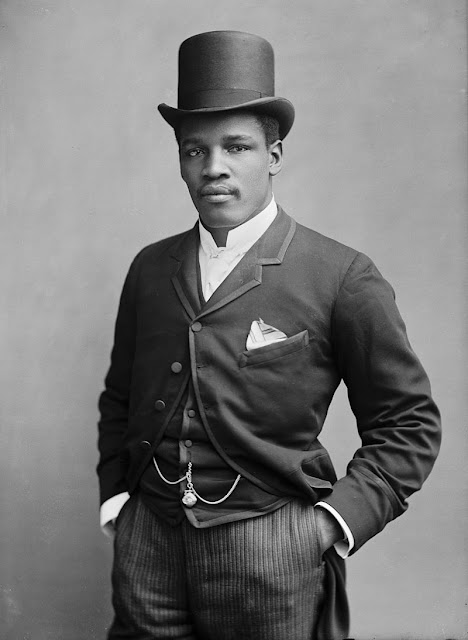(1) "Rest in Peace."
First appearance: Keyhole Mystery Magazine, June 1960.
Reprinted in AD 100, Volume 1 (2023).
Online at SFFAudio (HERE).
"Such a well planned murder that nothing could go wrong. Well, hardly anything."
AMBITION has a downside, as Macbeth discovered:
I have no spur
To prick the sides of my intent, but only
Vaulting ambition, which o’erleaps itself
And falls on th’other.
Henry, too, is riding for a fall . . .
Main characters:
~ Henry Sloucomb ("Had wanted to make money, lots of it, and fast. See the world. Live well"), Jacob Sloucomb ("My books, my memories are here. My friends, those who are left, are here. And the University is here"), Captain Todd ("The doctor says he's been dead for about two days"), and Calhoon ("What do you mean, 'What do I mean?'").
Resource:
- All of the other KEYHOLE stories accompanying "Rest in Peace" are linked (HERE).
(2) "The Memory Bank."
First appearance: EQMM, June 1967.
Reprinted in AD 100, Volume 1 (2023).
Online at The Luminist Archives (HERE; go to text page 61).
(Note: Text faded but legible.)
"We don't know if this is the first crime story spawned by automation—probably not; but surely it is an early example . . ."
PEOPLE IN GLASS HOUSES: We all know the old saying. HOIST BY THEIR OWN PETARD: That's another one. The Board of Directors should take those apothegms under serious consideration, because there's one person in their organization who has peered into their "glass houses" over the years and knows a lot more than they will ever be comfortable
with . . .
Main characters:
~ Thom Hart ("wasn't going to wait for the normal course of events"), Edwards ("After all, automation isn't everything. Humanity counts for something"), Joe ("Just want to keep on here like always"), May Jenson ("she'd have to go too, one of these days"), Stanton ("roared and pushed himself halfway up from the table"), Hopkins ("Suppose you retired on full salary, Joe. Eh?"), and Powell ("seemed to have shrunk back into his gray suit").
Typos: "Filemore"; "You'd bttr be quiet".
References and resources:
- "automation":
"The benefit of automation includes labor savings, reducing waste, savings in electricity costs, savings in material costs, and improvements to quality, accuracy, and precision. . . . The paradox of automation says that the more efficient the automated system, the more crucial the human contribution of the operators. Humans are less involved, but their involvement becomes more critical." (Wikipedia HERE.)
- "Corbett and Jackson":
"On May 21, 1891, Corbett fought Peter 'Black Prince' Jackson, a much-heralded bout between crosstown rivals, since they were both boxing instructors at San Francisco's two most prestigious athletic clubs. They fought to a no-contest after 61 rounds." (Wikipedia HERE.)
"On 21 May 1891, in Benicia, California Jackson fought the future world champion James Corbett. The match with Corbett went 61 rounds before it was declared no contest, as both boxers were too exhausted to continue." (Wikipedia HERE.)
- "Ty Cobb":
"[Tyrus Raymond] Cobb is credited with setting 9000 MLB records throughout his career. Cobb has won more batting titles than any other player, with 11 (or 12, depending on source). During his entire 24-year career, he hit .300 in a record 23 consecutive seasons, with the exception of his rookie season. He also hit .400 in three different seasons, a record he shares with three other players. Cobb has more five-hit games (14) than any other player in major league history. He also holds the career record for stealing home (54 times) and for stealing second base, third base, and home in succession (4 times), and as the youngest player ever to compile 4,000 hits and score 2,000 runs." (Wikipedia HERE.)
- "Braddock":
"[James Walter Braddock] was an American boxer who was the world heavyweight champion from 1935 to 1937." (Wikipedia HERE.)
- "Colley Cibber":
"Colley Cibber was an English actor-manager, playwright and Poet Laureate." (Wikipedia HERE.)
- "Millard Filemore [sic]":
"Millard Fillmore was the 13th president of the United States, serving from 1850 to 1853, and was the last president to have been a member of the Whig Party while in office. . . . Historians usually rank Fillmore among the worst presidents in American history, largely for his policies regarding slavery, as well as among the least memorable." (Wikipedia HERE.)
- "the Battle of Jutland":
"The Battle of Jutland (German: Skagerrakschlacht, lit. 'Battle of the Skagerrak') was a naval battle between Britain's Royal Navy Grand Fleet, under Admiral Sir John Jellicoe, and the Imperial German Navy's High Seas Fleet, under Vice-Admiral Reinhard Scheer, during World War I. The battle unfolded in extensive manoeuvring and three main engagements from 31 May to 1 June 1916, off the North Sea coast of Denmark's Jutland Peninsula. It was the largest naval battle and only full-scale clash of battleships of the war, and the outcome ensured that the Royal Navy denied the German surface fleet access to the North Sea and the Atlantic for the remainder of the war, as Germany avoided all fleet-to-fleet contact thereafter. Jutland was also the last major naval battle, in any war, fought primarily by battleships." (Wikipedia HERE.)
- "My mind to me a kingdom is":
My mind to me a kingdom is;
Such perfect joy therein I find
That it excels all other bliss
Which God or nature hath assign'd.
Though much I want that most would have,
Yet still my mind forbids to crave.
- "fragments of celluloid film":
"Celluloids are a class of materials produced by mixing nitrocellulose and camphor, often with added dyes and other agents. Once much more common for its use as photographic film before the advent of safer methods, celluloid's common present-day uses are for manufactur-ing table tennis balls, musical instruments, combs, office equipment, fountain pen bodies, and guitar picks. . . . Most movie and photography films prior to the widespread move to acetate films in the 1950s were made of celluloid. Its high flammability was legendary since it self-ignites when exposed to temperatures over 150 °C in front of a hot movie-projector beam. While celluloid film was standard for 35mm theatrical productions until around 1950, motion-picture film for amateur use, such as 16mm and 8mm film, were on acetate 'safety base,' at least in the U.S." (Wikipedia HERE; see especially HERE.)
- To say that Avram Davidson was prolific would be an understatement; his short fiction alone consumes four FictionMags pages.
The bottom line:
Unless otherwise noted, all bibliographical data are derived from The FictionMags Index created by William G. Contento & edited by Phil Stephensen-Payne.
~~~~~~~~~~~~~~~~~~~~~~~~~~~~~~~~~~~~~~~~~~~~~~~~~~~~~~~~~~~~~~~~~~~~~~~~~~~~














No comments:
Post a Comment